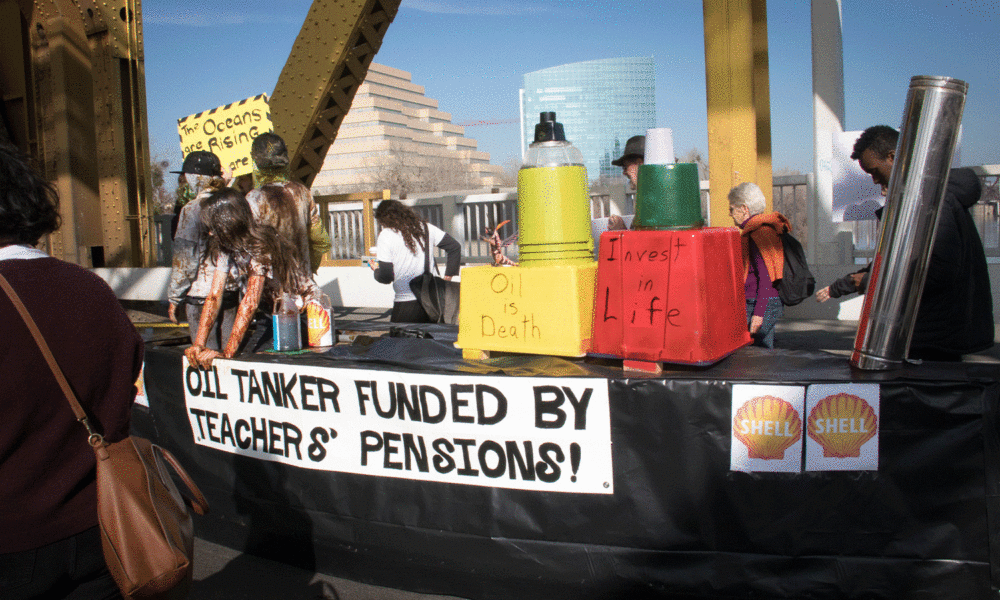State treasurers can be the forgotten children of public office. They don’t tend to have the name recognition of a governor or congressperson, and many of their own constituents don’t even have a clear sense of their job description. So how have state treasurers entered the spotlight in climate advocacy? And why are they banding together to change the ways corporations like ExxonMobil respond to the climate crisis?
Last week, 16 state treasurers from Oregon to Iowa to Massachusetts released a letter calling for corporate disclosure of climate risk and supporting efforts to boot corporate directors who fail to take appropriately urgent climate action. The letter packs a punch, representing treasurers managing more than $1 trillion in assets, and addresses corporations where these state assets are invested as well as investment firms like BlackRock, Vanguard, and State Street that often contract with states to manage those assets.
Shareholders are demanding leaders who will end climate delay
Their letter is just the tip of the iceberg. Campaigns by climate and financial activist groups, such as Stop the Money Pipeline and Majority Action, have been working with shareholders to reshape corporate boards of directors, voting off climate-denying or -delaying members and bringing in directors who will hold companies up to standard on climate action.
The letter was also published as climate risk disclosure takes its rightful the spotlight, with the Climate Risk Disclosure Act passing through the House Financial Services Committee this month, backed by 82 climate organizations, and President Biden issuing a complementary Executive Order just last week.
Climate risk can get mandated through regulation or legislation at the federal level. But corporate boards are elected by a company’s shareholders, and the slate proposed by a company almost always passes with incredible ease—often with nearly 100 percent of investor votes.
This year though, with state treasurers and climate-minded investors wanting to see quicker action from boards, companies are having to make the case for why their idling directors deserve a seat.
Perhaps if you, like me, have somehow made it onto ExxonMobil’s target demographic list, you’ve seen the ads the oil giant is serving up on social media to persuade investors to give its climate-lagging board another shot. The ads boost the profile of new directors ExxonMobil has appointed this year to enhance its public climate credentials, though the picks (a former fossil fuel CEO and a semi-reformed venture capitalist) leave little hope that they’ll usher in meaningful change:

ExxonMobil twitter ads promoting their corporate board members with climate-friendly soundbites and encouraging shareholders to vote to reelect the current board.
State treasurers are responsible for protecting our futures
As it turns out, your state treasurer has a lot more power in the fight against climate change than you may have imagined.
State treasurers manage their state’s investments, which means they’re making big decisions about where big budget items, like public pensions, are being held. But commonly, state treasurers aren’t making those investments directly. Just like an employer might contract a separate group to manage your retirement funds, state treasurers contract big asset managers such as BlackRock and Vanguard to do the nitty gritty work of choosing the companies where state assets get invested.
BlackRock and Vanguard are two of the world’s largest investors in fossil fuels, which means that if your treasurer is relying on them (or nearly any other major asset manager) to manage state funds, those funds are wrapped up in fossil fuels that continue to drive climate destruction. For state assets like pension funds—on which public employees such as teachers, firefighters, and bus drivers rely to retire— those fossil fuel investments are particularly risky.
I think of it this way: retirement funds are inherently designed to last for decades, which means the businesses they’re invested in need to be savvy investments for just as long.
In previous decades, investments in fossil fuel companies may have represented a smart opportunity to make those pensions grow. But now, fossil fuel company investments are only pulling them down. Not only did “Mad Money” host Jim Cramer declare fossil fuel investments “done” last year, but the industry-friendly International Energy Agency recently reported that to meet the goals of the Paris Climate Agreement, we need to stop new expansion of and investment in fossil fuel infrastructure.
What does that mean for state treasurers? Well, you might think that someone responsible for protecting the retirement funds for thousands of public employees might want to get that money out of high-risk companies and industries that are expected to stop returning on their investment. You might also think that at a fundamental level, protecting people’s future means protecting the planet they’ll need to live on by pulling away from destructive fossil fuels. You’d be right on both counts.
Treasurers have the ear of asset managers with a direct line to Big Oil
As large customers of BlackRock, Vanguard, and other asset managers, state treasurers also have significant sway with these investors.
Those asset managers, in turn, have a major voice at the annual shareholder meetings of fossil fuel companies such as ExxonMobil and Chevron coming up this week. That means when state treasurers speak, investment giants like BlackRock have to listen, or risk losing business. And as the world’s largest investor, when BlackRock shows up to those fossil fuel company shareholder meetings, it has a massively outsized vote in who gets elected to the companies’ boards of directors.
State treasurers can demand that BlackRock and its peers end the wait-and-see attitude that has prevailed thus far, and instead force these enormous investors into voting for climate action—and voting for those who will bring it.
While BlackRock CEO Larry Fink has made public commitments to moving the firm more aggressively toward aligning its investments and voting records with climate action, shareholders and activists have repeatedly noted that his words lack teeth.
State treasurers’ influence will be seen this Wednesday
This Wednesday, BlackRock will hold its own annual shareholder meeting on the same day that it casts its votes at oil majors ExxonMobil’s and Chevron’s shareholder meetings.
Has pressure from climate-minded state treasurers successfully moved BlackRock to act? Will the asset manager’s customers force it to finally vote for serious climate leaders and all-important climate risk disclosure? We’ll have to wait and see. But now, state treasurers are coming around to see that demands for climate action can’t wait at all.
If you’re not sure where your state treasurer is investing public funds—and how they’re using their power to push for change as an investor—take the first step and ask. Tell your treasurer you want to see them join their peers in telling BlackRock, Vanguard, and other asset managers to shape up and demand urgent change. And hey, if your real first step is Googling your state treasurer’s name, I’ll never tell.

